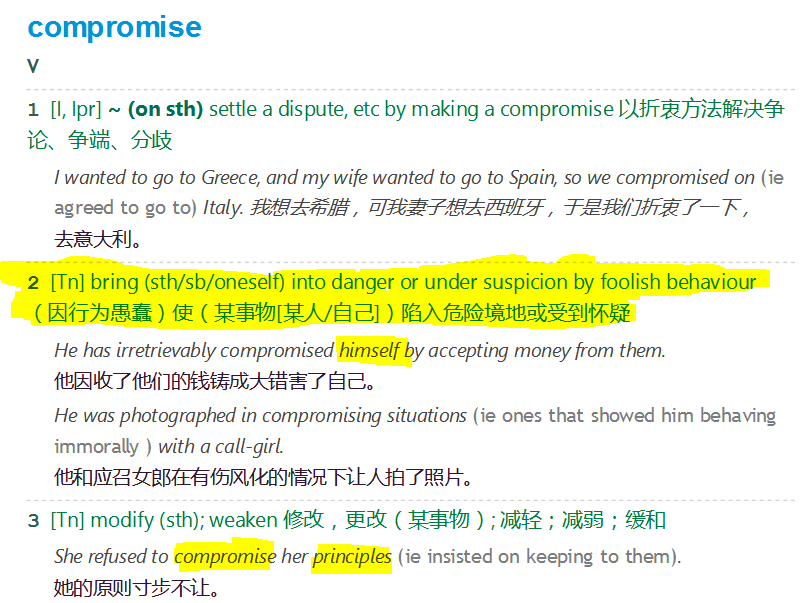THE EVIL THAT MEN DO 人的恶行 | Chapter 9 | THE TWO BROTHERS 两兄弟 | Chapter 10
2017年12月15日, 星期五
compromise one's integrity
There is something curious about Tseyu; less headstrong than his brother, he had always, without compromising his integrity, nevertheless been able to look out for himself and to choose a safe and obscure position, living in the company of some great scholar.
integrity在这里意思为“quality of being honest and morally upright 诚实而正直”。
compromise在这里的意思为“to do something which is against your principles and which therefore seems dishonest or shameful”,有“放弃;背离;违背(原则、信念);达不到(标准)”等意思。compromise在这个意思下与名词的搭配之一就有integrity:
原文对应子由without compromising his integrity的中文译文为“洁身自好,使清誉不受沾染”。这个搭配字面上的翻译更贴近“不违背正直”,有坚守原则,光明磊落的意味。
译文提到的“清誉”,字典对compromise的解释中也有类似说法,“声誉”:
柯林斯在以上释义中用了themselves,然而在牛津四中,compromise oneself的搭配是与compromise one's principle并列的另一个词条:
在牛津七中“~ sb/ sth/ yourself”也单独作为一个义项列出,意为“to bring sb/ sth/ yourself into danger or under suspicion, especially by acting in a way that is not very sensible (尤指因行为不很明智)使陷入危险,使受到怀疑”。
我认为,当提及“使自己声誉受损”时,柯林斯对compromise的英文释义中的“If someone compromises themselves”和例句中的“government who have compromised themselves 使自己名誉受损的政府成员”,都是compromise与oneself的搭配,带有贬义,表示对名誉的损伤;而原文译文中“使清誉不受沾染”则恰恰相反,是正面的、褒义的表达,语意里带有出淤泥而不染的感觉,手法上是“沾染”和“洁身自好”的互文和呼应。
这里翻译没有问题。只是作为词组挑出来学习和记忆,我认为有必要对用法含义和感情色彩进行一定的界定和区分。
to and fro
Later, when Chang Fangping retired and moved to Shangchiu, then called Nanking, or "Southern Capital," Tseyu had himself appointed to a post there also, and in the following years Su Tungpo always stopped at Chang Fangping's house on his way to and from the capital, asking and getting advice from him as from an uncle.
to and from the capital,这里应该就是两个介词用and并列,仍作为介词,中文译文对应为“往返京都”。
有意思的是,to and fro是一个长的相像意思也相近的短语:
词组to and fro在字典中标明是副词词性,例句如
- I was disturbed by all the people walking to and fro outside the office.
办公室外人来人往让我安不下心来。 - She was gazing out the window, rocking rhythmically to and fro.
她注视着窗外,身体有节奏地来回摇晃着。
to-ing and fro-ing与to and fro类似,是作为名词使用,除了“往复”,亦有“纷繁”:
另外,在剑桥中写作“to-ing and fro-ing”,在朗文中则作“toing and froing”。
plump
Tseyu was taller, and had a plumper, rounder face, with plenty of loose flesh round his cheeks, while Su Tungpo had a more muscular build, with the right proportion of bone and muscle.
这里是胖胖的子由~
plump:丰满的;胖乎乎的;圆滚滚的;You can describe someone or something as plump to indicate that they are rather fat or rounded.
上图是以前在有道app首页推荐看到截取的,完整版见网页:近义词辨析 | "你不胖,你只是肉肉的!",用英语应该怎么说
If Your Majesty will look at these pictures and take my suggestions for abolishing reforms, if it does not rain within ten days, you can behead me on the execution ground outside the Shiianteh Gate as a punishment for lying to Your Majesty.
It began to rain. Truly God was pleased!
读到这里的时候,也仿佛跟着神清气爽而喜上眉梢。这时候慢慢觉得作者安排Chapter Six GODS, DEVILS, AND MEN是一步大棋,为后文做足了铺垫。苏东坡的祈雨,“喜雨亭”("Pavilion of Joyful Rain"),救民于水火(all his life he was fighting floods and drought);而王安石变法忤逆天意,山崩(landslide on a sacred mountain)荒旱(the widespread famine)涂有饿孚(families being separated and refugees roaming over the countryside)。
It took a visible demonstration of God's anger and the curious gatekeeper of the palace to put Wang Anshih out of power.
“天命”某种意义上虚妄的寄托,但文学上确实能让读者有如坐针毡的不适之感。对此王安石回应是:
"Floods and droughts are natural calamities; they occurred even in the regime of the ideal emperors Yao and Tang. All we need to do is to carry on with a good government."
“旱涝乃是天灾,在尧汤之世也曾发生。吾人之所能为者只是力行善政而已。”
单读这句话觉得特别在理。不知怎的想起上一章读到的:
How many political crimes have been committed in history in the name of "the people"
越是逻辑无懈可击,表达也铿锵有力的话语,有时候越是有无法弥补的漏洞。功过的评判或者不是那么重要,毕竟客观总是难的,而有说服力的证据和言词总是那么少。
以下是贾平凹《废都》选段:
正好天上落雨,噼噼啪啪如铜钱砸下,地上立即一片尘雾,转眼又水汪汪一片,无数水泡彼此明灭。众人皆走散了,老头说声“及时雨”,丢下车子不顾,也跑到孕璜寺山门的旗杆下躲雨,因为待得无聊,也或许是喉咙发痒,于哗哗的雨声里又高声念说了一段谣儿。
没想山门里正枯坐了孕璜寺的智祥大师,偏偏把这谣儿听在耳里。孕璜寺山门内有一奇石,平日毫无色彩,凡遇阴雨,石上就清晰显出一条龙的纹路来,惟妙惟肖。智祥大师瞧见下雨,便来山门处查看龙石,听得外边唱说:“……阔了当官的,发了摆摊的,穷了靠边的……”若有所思,忽嘎喇喇一声巨响,似炸雷就在山门瓦脊上滚动。仰头看去,西边天上,却七条彩虹交错射在半空,联想那日天上出现四个太阳,知道西京又要有了异样之事。果然第二日收听广播,距西京二百里的法门寺,发现了释迦牟尼的舍利子。
是不是也有天命难违之感。
以上。






